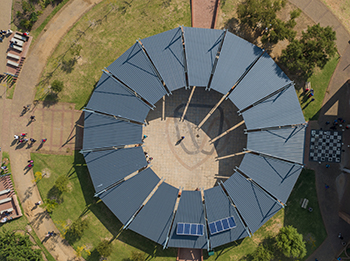Latest News Archive
Please select Category, Year, and then Month to display items
![]()
Prof Marian Tredoux, Associate Professor in the
Department of Geology at the University of the Free State,
recently had a mineral named after her.
Photo: Sonia Small
Prof Marian Tredoux is a geochemist and lecturer in the Department of Geology at the University of the Free State (UFS). Her research interests are rocks, particularly the chemistry of rocks and the minerals they are composed of – chemicals similar to those found in laboratories, although they occur in nature.
Prof Tredoux started her research career at the University of the Witwatersrand (Wits), after which she spent a number of years at the University of Cape Town (UCT). For the past 11 years, she has been at the UFS, which has brought her in close proximity of her primary field-research area in Barberton. This fascinating part of the country has been the focus of her research for 30 years. She has always been intrigued by the earth's crust in this area, which she describes as "very old, very strange, and very interesting".
Prof Tredoux has been collaborating with colleagues and peers overseas in an attempt to unravel the intricacies of this unusual geological area. Some of these colleagues recently discovered a new mineral in one of the rock formations of the Barberton mountain range. They decided to name the mineral after Prof Tredoux, dubbing it tredouxite. "I am very honoured by this, and very grateful that all these years of collaboration are being acknowledged," Prof Tredoux said.
Renewable energy systems an economical investment for the UFS
2017-06-14

The Qwaqwa Campus Arena equipped with freestanding
roof solar panels.
Photo: iFlair Photography
Renewable energy systems are said to be very expensive to implement initially, but in the long run they provide high economic returns.
With their decision to install renewable energy, the University of the Free State Department of Facilities Planning has now also adopted this innovative technology. They have chosen less capital-intensive solar power-generating options to generate electricity in various buildings and parking areas on all three UFS campuses.
“As per the UFS Energy Management Policy, all designs incorporate efficient, renewable energy sources varying from LED lights to solar power,” says Anton Calitz, Electrical Engineer in University Estates’ Department of Facilities Management.
South Campus taking the lead in renewable energy usage
In December 2016, a total of 26 solar-driven LED street-light poles were installed at the recently built Legae Residence’s parking area and the perimeter security area on the South Campus. This low-maintenance system improves security after dark and is independent of the national power supply, which is an important advantage during power outages. With no requirements for major earthworks and cable setting, operational costs are reduced.
The recently built infrastructure also takes pride in being the first to have a greywater system installed. This system will also be installed at three other residences on the Bloemfontein Campus in 2017. Greywater is made up of bath, shower, and bathroom sink water. The water is reused for toilet flushing, as well as for irrigation purposes.
Various UFS electrical operations to depend on solar power
On the Bloemfontein and Qwaqwa Campuses, the computer laboratories as well as the Thakaneng Bridge Student Centre and the projected Afromontane Research Centre will be equipped with freestanding roof solar solutions during 2017. These systems are designed to operate independently of the power grid (Eskom).
The systems only operate during sunlight hours when the PV solar panels are heated by the sun, making them suitable for operations such as ventilation fans, water pumps, and small circulation pumps for solar thermal water-heating systems.